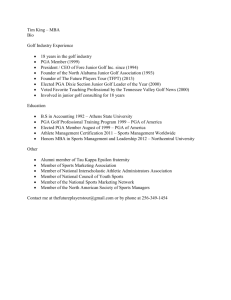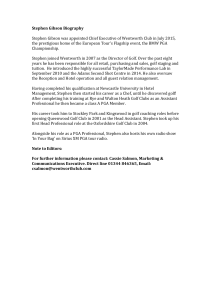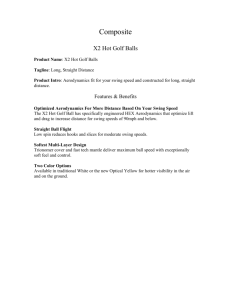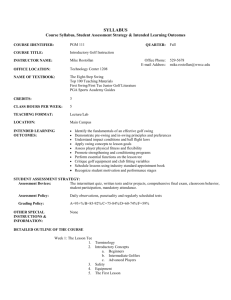DUE DATE: 2 August 2012
advertisement
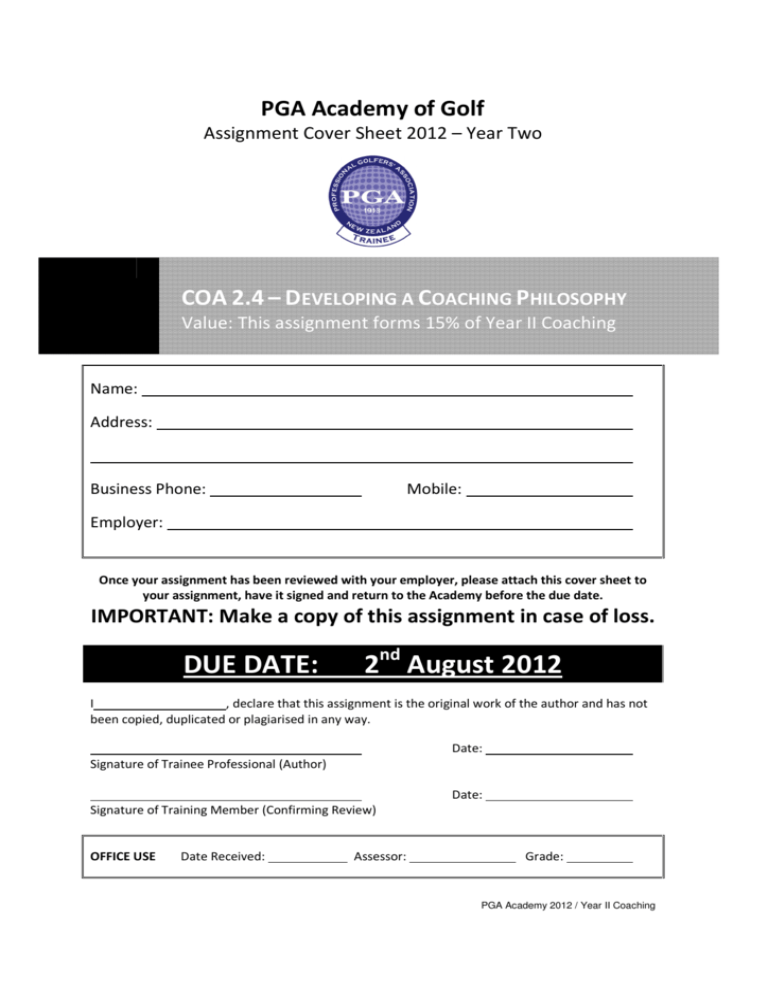
PGA Academy of Golf Assignment Cover Sheet 2012 – Year Two COA 2.4 – DEVELOPING A COACHING PHILOSOPHY Value: This assignment forms 15% of Year II Coaching Name: Address: Business Phone: Mobile: Employer: Once your assignment has been reviewed with your employer, please attach this cover sheet to your assignment, have it signed and return to the Academy before the due date. IMPORTANT: Make a copy of this assignment in case of loss. DUE DATE: 2nd August 2012 I , declare that this assignment is the original work of the author and has not been copied, duplicated or plagiarised in any way. Date: Signature of Trainee Professional (Author) Date: Signature of Training Member (Confirming Review) OFFICE USE Date Received: Assessor: Grade: PGA Academy 2012 / Year II Coaching "You need to understand golf in its total complexity so you can teach it in its utter simplicity" - Tommy Armour, PGA Professional HOW DO GOLF PROFESSIONALS LEARN TO TEACH? by Dr Gary Wiren Have you ever stopped to think how you learn? How you learn to do anything like type, or play the piano or drive a car. There are of course a lot of ways you can learn, particularly in regards to motor skills like those mentioned, You can read about the skill, watch others perform, study pictures, mentally rehearse, listen to tapes, view films - you name it, there's a way it can be learned. But any method of learning other than "learning by doing" finishes a distant second place. Learning to play golf works that way - any learning to teach the game is not different. Anyone who has stood long hours on the lesson tee for a period of years teaching the golf swing has to have some pretty good insight as to what does and doesn't produce success. In a way, teaching golf is like piloting an airplane. Flying is not too difficult when all the equipment is in perfect working condition and the weather favourable. The real test comes when things don't go as planned, when the weather turns bad and instruments fail. Then experience makes the difference. Golf is taught to human beings who like the weather are far from predictable and only on infrequent occasions in perfect working order. Individual differences alone make the task of teaching a tremendous challenge. Mastering the art of teaching can be a lifelong quest. Knowing the subject matter is not enough; communicating it successfully to a variety of people is what puts teachers to the test. The best example I can give of this phenomenon concerns a university golf class I was teaching several years ago. One student, an excellent varsity golfer, requested permission to bring a friend so that the student could get some additional help. I granted his request as he seemed really enthusiastic and he began coming to my classes. This is what I observed: The young student had in the first few classes developed some basic motion and a sense of rhythm in his swing which was producing good success in moving the ball. He seemed to be getting the hang of "feeling a swing". After a warm-up period, he prepared to hit a few shots for his teacher-friend. Being a little nervous, he resorted to instinct on the first shot and righthanded it badly enough so that his left arm collapsed causing him to barely tick the top of the ball sending it only a few feet from where he stood. "Oh you bent your left arm" said his temporary mentor, "don't bend your left arm on this next swing". The pupil didn't - but in attempting not to bend his left arm as in his downswing so that he ended up hitting some four inches behind the ball. The resulting distance bore a striking resemblance to the first shot. "You struck on your back foot" said the varsity golfer friend. "Don't stay on your back foot this time". So in trying not to bend his arm and not to stay on his right foot during the swing, it was impossible for the pupil to get the club-head to meet the ball anywhere but on the sole. He was three for three. "Oh, you raised your head up, don't do that!" "Don't bend your arm, don't keep your weight on your back foot, don't raise your head" and on it went. In 15 minutes the pupil looked like a robot whose programming had gone haywire, not knowing what to do, only recognising there were many things that he shouldn't do. It is generally accepted that we learn a great deal from observation. It might be a club repair, how to play a flick wedge or how to use the cash register, whatever the task we do learn from observation. PGA Academy 2012 / Year II Coaching THE ASSIGNMENT This assignment covers key teaching component elements of the course and as such requires an appropriate level and depth of research. All discussion should be reflective of the importance of this task. TASK 1 You are required to observe three (3) lessons conducted by three (3) different PGA Members (i.e. 3 lessons total). After each lesson you are to: a) Complete the attached report form, and discuss the lessons with the professional. All lesson sheets are to be sighted and signed by the professional. b) Compare (show similarities) and Contrast (discuss differences) the 3 PGA Members you have viewed taking into account ALL the lesson subheadings on the report form you completed in part a (presenting this information in table format would be appropriate). c) Identify two (2) areas of the above coaching styles that you like and two (2) areas that you dislike. You should then discuss how these areas may be beneficial or detrimental to your own coaching development. TASK 2 As your teaching develops you will require a broader range of drills to assist you in helping your clients achieve their technical swing changes. From the PGA Trainee Teaching Manual, page 530 - 540 select (1) drill from each of the following sections: a) b) c) d) e) f) g) Grip Putting Chipping Bunker Pitching Full Swing Set Up Full Swing Motion You are then required to critically review the drill providing feedback from your own experiences performing the drill. Include an analysis on the strengths and weaknesses of the drill and any improvements or enhancements that you feel would make the drill more effective. PGA Academy 2012 / Year II Coaching TASK 3 You are to video yourself undertaking a 30 minute lesson with a member at your golf course. You are to then review your lesson and make an appraisal of your teaching performance using the headings listed below. Under each heading and as an introduction to each appraisal you are to bullet point the two most relevant issues that best describe the content of the appraisal below. The Academy suggests that you set out your lesson appraisal in a format similar to the table below: Lesson Heading Preparation for the Lesson Two (2) most relevant teaching points • • Appraisal of my Teaching Performance Lesson Headings • • • • • • • • Preparation for the lesson Lesson structure Communication style - clarity of explanation and instruction Error identification and reasons for this Drills and/or teaching aids used to affect changes Comment on your ability to demonstrate to the student effectively How did you assess that changes were effective? Describe your ability to provide appropriate feedback to the student. Note: You are to include footage of the lesson from three camera angles; down plane, face on and in front. The lesson should be copied to a USB stick or CD-R disc and be in windows media avi format (DVD-R Disc if in DVD format). You should also ensure that your voice can be clearly heard so your main teaching points can be assessed. Please check that the USB stick or disc works before sending it to the Academy as non-functioning disks will be returned to candidates unmarked. PGA Academy 2012 / Year II Coaching OBSERVATION OF GOLF LESSON TRAINEE’S NAME: ________________________________ PROFESSIONAL: __________________________________ GENDER: _______ HANDICAP: _______ ADULT MALE ADULT FEMALE JUNIOR CONTENT YES NO LESSON TYPE: FULL SWING SHORT GAME GROUP INFORMATION GATHERED/DISCUSSION/DEMONSTRATION/OBSERVATION PRE LESSON INFORMATION & PLAYERS GOALS WARM UP TECHNICAL CONTENT & ERROR DETECTION METHOD EG. Swing Analysis, Video etc… ERROR CORRECTION AND EXPLANATION (3 Key Teaching Points) • • • LIST PRACTICE DRILLS LIST COACHING AIDS USED PGA Academy 2012 / Year II Coaching POST LESSON PRACTICE SCHEDULE? (written, video, email) FOLLOW UP SESSIONS AND PLANS? Discussed with professional post lesson: Signed by Professional: PGA Academy 2012 / Year II Coaching
